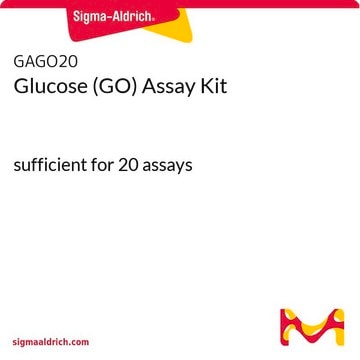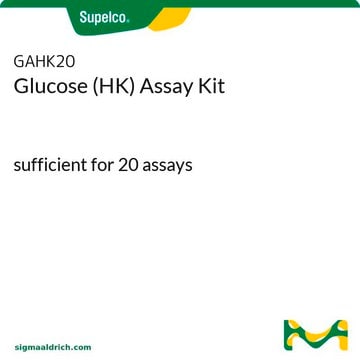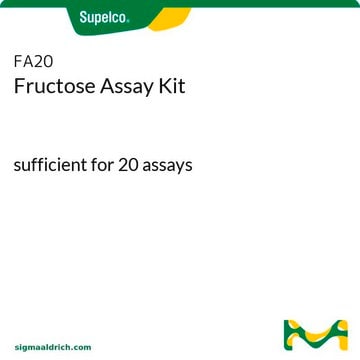G3293
Glucose Assay Reagent
for use with enzymatic assay kits GAHK20, SCA20, FA20, SA20
About This Item
Recommended Products
Quality Level
analyte chemical class(es)
sugars (glucose)
technique(s)
photometry: suitable
impurities
≤0.005% Creatine phosphokinase, glutathione reductase, myokinase, NADH-oxidase,NADPH oxidase, phosphogluconic dehydrogenase, phosphoglucose isomerase, lactic dehydrogenase
<0.01% ATP-ase, myokinase
application(s)
food and beverages
general analytical
storage temp.
2-8°C
Specificity
Application
related product
Storage Class Code
11 - Combustible Solids
WGK
WGK 3
Flash Point(F)
Not applicable
Flash Point(C)
Not applicable
Personal Protective Equipment
Certificates of Analysis (COA)
Search for Certificates of Analysis (COA) by entering the products Lot/Batch Number. Lot and Batch Numbers can be found on a product’s label following the words ‘Lot’ or ‘Batch’.
Already Own This Product?
Find documentation for the products that you have recently purchased in the Document Library.
Customers Also Viewed
Protocols
Enzymatic Assay of α-Glucosidase by the Modified Boehenger Procedure (EC 3.2.1.20)
Enzymatic Assay of α-Glucosidase by the Modified Boehenger Procedure (EC 3.2.1.20)
Enzymatic Assay of α-Glucosidase by the Modified Boehenger Procedure (EC 3.2.1.20)
Enzymatic Assay of α-Glucosidase by the Modified Boehenger Procedure (EC 3.2.1.20)
Our team of scientists has experience in all areas of research including Life Science, Material Science, Chemical Synthesis, Chromatography, Analytical and many others.
Contact Technical Service






